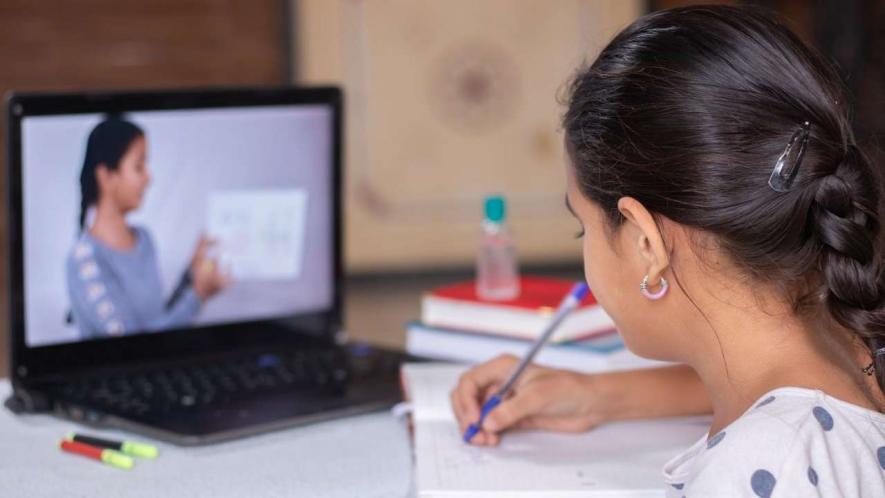Will Digital Divide in Education Affect Alternative Assessments?

Representational Image. Image Courtesy: DNA India
Recently, the PM of India endorsed the decision of CISCE cancelling class XII Board exams in view of the safety and anxiety concerns among parents, students and teachers amid the second wave of pandemic. There is a serious disruption in the education sector causing a huge loss of learning time. While the pandemic accelerated the adoption of digital education, the level of digital divide has caused a greater inequality of the underserved. This is an issue that merits serious attention. People had little choice to adopt online learning or adapt to it. The CISCE’s decision to cancel Board exams has called for serious debate on the nature of alternative and formative assessments.
In the wake of systemic inequalities, the huge digital divide manifests automatically. The pandemic has restricted the choice, yet there is a great resistance to online learning. It cannot be divorced from the mixed realities of online and offline learning in a large and diverse country. The middle and rich class has made use of online learning opportunities when the less-affluent classes in semi-urban or rural areas struggle to find such opportunities.
Alternative Assessment: Challenges
In the backdrop of the National Education Policy 2020 (NEP 2020), institutions will face immense challenges to maintain an objective assessment in designing MCQs on critical thinking or problem solving skills, citizenship skills or self-directed inquiry methods, collaborative social skills, and in monitoring formative assessment. Learning management systems, types of project-based assessment and online proctored exams need sound digital infrastructure and stable internet connectivity. Alternative assessments manifesting a uniform and reliable evidence of learning outcomes is a serious challenge in such conditions. The issue is how we implement AA in a remote rural setting where learners or teachers face the problem of inaccessibility as compared to the affluent urban settings. Rather AA featuring written assignments, online open-ended discussions, and quizzes demands a different orientation to teachers administering such tests.
Inviting presentations on concepts based on synchronous or asynchronous learning and conducting informal tests with comprehensive feedback, short and periodic self-assessments may look less intimidating on paper but arguably it will affect millions in terms of not showing tangible evidence of reliability and validity as assessment measures. Rather the greater proportion of rural population are not trained or exposed to the new normal ways of AA in the online educational context.
Many will be hardest hit by location, setting and context. A handful of institutions can adopt this change. Recently, the AICTE has entered into an agreement with Cambridge Assessment English for standardised assessment of English teaching-learning quality. But this is not enough since the biggest challenge is how alternative methods of assessment will cater to educational institutions in rural areas or to the deprived population. The idea of doing away with the rote learning and putting the role of socio-cognitive emotional skills and conceptual clarity is well taken but it is not clear as to what degree it is possible to carry out an objective assessment for measuring the desired learning outcomes. Will there be one benchmark set up to measure learning or if these would differ according to differential needs and contexts Alternative assessments cannot balance ‘knowledge about ‘and 'knowledge how’ when there is a greater lack of access to technological availability and training resourcefulness, particularly on the part of stakeholders coming from rural or disadvantaged backgrounds.
AI- FUCTO Reservations
The All India Federation of University and College Teachers' organisation (AI- FUCTO) has expressed its reservation on the UGC draft notification of May 20 related to the blended mode of teaching and learning as this will ultimately dismantle the constitutional provisions of equity, quality, access and inclusiveness . The resolution objects to the proposal for increasing the quantity of online digital modes of pedagogic processes on the ground of lack of interactivity .
Economic and Digital divide
The diverse digital and economic divide would make the educational institutions difficult to implement AA in rural or semi-urban institutions. Recently, the Supreme Court has grilled the Government of India about its insensitivity to the digital divide. Almost half of the school population will be digitally marginalised.
On the face of it may look like an inclusive measure, but AA, if not in place, will gravitate more towards exclusion. Advantage or opportunity may work more on the side of affluent private and urban educational institutions and their access to quality will not help in bringing fairness to the very objectives of AA. Lack of parity and fair assessment across diverse economic population will become the biggest concern of the testing agencies. That's why in advanced countries like Canada where the issue of diversity is different from ours, assessment is still the biggest concern. In the pandemic times, AA is practiced but any type of assessment that requires students to work together is not assigned.
Teacher Preparedness
AA demands effective teacher training for meeting the criteria of reliability and validity. Is there enough time to train the teachers to implement AA or can testing agencies be roped in to ‘train the trainers’ in a short time?
Policy makers will have to drill down and come up with the specific demographic dividend plan for AA's wider accessibility and implementation. Only then AA would show evidence of measuring desirable learning outcomes.
(Raashid Nehal is Professor at the Department of English & Zainab Mustafa is doing her MA ELT at the Dept of English , Aligarh Muslim University. Views expressed are personal.)
Get the latest reports & analysis with people's perspective on Protests, movements & deep analytical videos, discussions of the current affairs in your Telegram app. Subscribe to NewsClick's Telegram channel & get Real-Time updates on stories, as they get published on our website.























